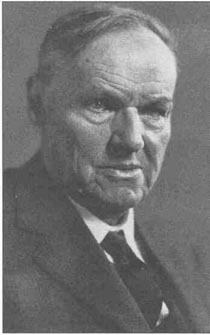 |
Home | Search | Browse | About IPO |
Staff |
Links |
Book Reviews
|
|
By WOLF D. FUHRIG
Geoffrey Cowan. The People v. Clarence Darrow: |
"Two jurors bribed; two witnesses paid to get out of the country; two witnesses paid to testify falsely; a corrupt scheme to destroy certain physical evidence in possession of the state authorities; the corruption of practically every employee of the Los Angeles County Jail... ."
This "powerful package of wrongdoing" is the central concern of Geoffrey Cowan's book about the Clarence Darrow of whom relatively little is known today; not the flamboyant attorney in pursuit of social justice, but the criminal defendant desperately maneuvering to stay out of prison. The author of this painstakingly researched study, a public interest lawyer, takes nothing away from Darrow's legendary fame as an undaunted advocate for unpopular causes, but he also leaves no stone unturned to uncover Darrow's "cynicism, greed, and vanity."
To place Darrow's 1912 bribery trial within the full context of his life and times, Cowan first gives the reader a detailed description of the colorful cast of characters that shaped his fortunes: personal friends and enemies, labor, business and community leaders, professional associates, defendants, detectives, opposing prosecutors, judges, jurors, witnesses. As we see their foibles and scruples revealed in their scrambles for whatever they valued, we are treated to a fascinating panorama of the rugged and ruthless individualism of American society between the Civil War and World War I.
The spirit of the times and the twist of events, however, do not adequately explain what made Darrow struggle so fiercely for the downtrodden while simultaneously employing every dirty trick known to shysters and shylocks. Hence, Cowan conscientiously sketches, as far as possible, Darrow's intellectual and emotional development, even the tangled web of his relationships with his wife and his mistresses. All the facts and anecdotes the author digs up, however, only reinforce the impression that the contradictions in Darrow's character defy consistent conclusions.
It was in the defense of Jim and J.J. McNamara, brothers and labor union agents accused of bombing the Los Angeles Times offices, that Darrow reverted to such outrageously immoral and illegal tactics that the state's attorney had no choice but to seek his indictment. Darrow saved the McNamara brothers from the gallows, but his reckless conduct in the process jeopardized his career as a member of the bar. "He is scared;" observed his friend, the journalist Lincoln Steffens, "the cynic is humbled; the man that laughed sees and is frightened, not at prison bars, but at his own soul." His freedom, his fortune and his fame were squarely on the line.
Clarence Darrow survived this darkest hour, thanks to the same tactics he had so often employed on behalf of his clients: turning the tables on the prosecutors, putting them on trial and mesmerizing the jurors with a vast repertoire of theatrics. When he ended his plea in his own defense, "his face was streaming with tears and the jury was weeping like children, with not a dry eye in the crowded courtroom."
The People v. Clarence Darrow vividly details the whole range of legal as well as illegal and unethical maneuvers employed by most of the participating defense attorneys, prosecutors and detectives. Cowan's analysis of the court proceedings in which Darrow was involved reveals serious flaws that persist in the adversarial system, the American way of delivering justice. More often than not, the defendant's fate hinges upon the craftiness of his attorney. The criminal trial is not primarily a search for the truth or falsehood of the charges but a contest between courtroom actors for the hearts and minds of the jury. For Darrow, as for other celebrated attorneys, the end justified means far beyond the bounds of what is legally permissible. Cowan offers plenty of evidence for the contention that in American courts money buys the most skillful attorneys and thus the best chance for the desired verdict.
In his summation the author surmises that Darrow "was capable of persuading himself, as well as others, of almost anything, was convinced of his own virtue and believed that he was telling the truth." One wonders if this and similar generalizations are not too sweeping to be credible. Yet such a potential flaw does not detract from the immense amount of primary research the author has done in over 30 document collections as well as in numerous oral histories and interviews. Because the book presents a conscientious and compelling study of a significant episode, it recommends itself equally to the lay reader and the scholar interested in the turbulent life and times of an American original.
Wolf D. Fuhrig is professor and chair of the political science and criminal justice departments at MacMurray College at Jacksonville.
January 1994/Illinois Issues/29
|
|
